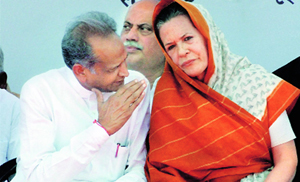 Jaipur, Jun 21: UPA chairperson and Congress president Sonia Gandhi on Thursday slammed the opposition for stalling the food security Bill and asked the people to be cautious of such parties which try to create instability in the country.
Jaipur, Jun 21: UPA chairperson and Congress president Sonia Gandhi on Thursday slammed the opposition for stalling the food security Bill and asked the people to be cautious of such parties which try to create instability in the country.
Sonia, who inaugurated a power and a water supply project in Rajasthan on Thursday, said the UPA government would have fulfilled its promise of not letting anyone go to sleep hungry through the food security Bill had it not been for the opposition who did not allow the passage of the Bill.
Addressing a gathering at Suratgarh, where she laid the foundation stone for two units of 660 MW each of power station, Sonia said, "I want to let you know that a few political parties are trying to create instability in the country. When there is political instability, developmental works are the first to be hit, progress is stalled and the poor suffer the worst. But these forces have nothing to do with development and are only hungry for power. They want to be in power at any cost. I want to caution you against such forces."
Hailing the people in the poll-bound state, she said, "Since time immemorial Rajasthan has shown the whole country the way to live with dignity. Living up to this tradition, together we have to pave the way for progress. We will keep moving forward with this resolve, honesty and hard work and give a fitting reply to those who hinder progress and developmental work in the country."
Sonia laid the foundation stone of two units of 660 MW each at Suratgarh Power Station in Sriganganagar district. These will be the seventh and eighth units of super critical thermal power station at Suratgarh slated to be completed by 2016-17 and have been built at a cost of Rs 7,920 crore.
She was accompanied by Chief Minister Ashok Gehlot and Energy Minister Jitendra Singh. Later in the day, she inaugurated a Rs 2,938 crore water supply project at Jayal in Nagaur district.





Comments
Add new comment